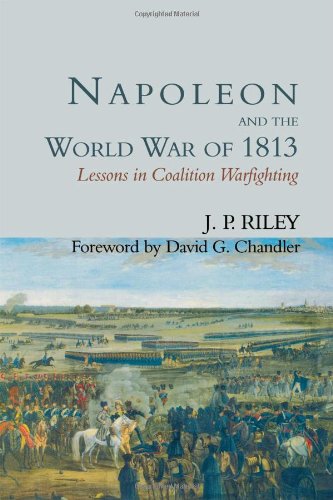
"Napoleon and the World War of 1813: Lessons in Coalition" Topic
3 Posts
All members in good standing are free to post here. Opinions expressed here are solely those of the posters, and have not been cleared with nor are they endorsed by The Miniatures Page.
Please do not use bad language on the forums.
For more information, see the TMP FAQ.
Back to the Napoleonic Media Message Board
Areas of InterestNapoleonic
Featured Hobby News Article
Featured Link
Featured Profile Article
Featured Book Review
|
| Tango01 | 18 Jan 2022 9:19 p.m. PST |
…Warfighting "It's been a while since I have posted anything. I've been reasonably busy on the hobby front, but I'm getting a bit bogged down on improving my terrain – which involves many parallel paths with a rather distant endpoint. Meanwhile I have been reading a bit, and I'm reporting back on this book by Lieutenant-General Jonathan Riley (or J.P. Riley) published back in 2000. I remember reading a review of it in The Economist, and I eventually picked it up at a bookstall in Salute a number of years later; it languished a number more years before I eventually read it. Since my Napoleonic hobby projects are increasingly focusing on 1813, after 1815, it struck me as relevant. The book is a high level account of three campaigns in 1813: in Central Europe, with the decisive battle of Leipzig, in Spain (with Vitoria as the centrepiece) and in North America, especially in Canada as the War of 1812 played out. The nominal theme of the book is the study of how multinational coalitions work in warfare, where he draws out parallels from later wars, right up to NATO. The coalitions are self-explanatory in the case of the first two campaigns (and include Napoleon's armies in Central Europe, albeit that the French allies were highly subordinate); in Canada the British side is presented as a coalition between the British government, French and British colonists, and the Native American tribes (which he, back n 2000, is able to call "Indians", though his account does accord them full respect). The narrative and the commentary on coalitions don't integrate entirely satisfactorily though – the narrative tends to take over, and it is not especially penetrating on his main subject. I read a very interesting study of coalition fighting a few years ago which was based on a research thesis by an American military academic, which used the Russian-Prussian alliance in 1813 as a case study – and which got much more into the weeds of coalition warfare. It was able to do this because the researcher got behind the mainstream campaign accounts and into some of the telling details. An example was the complaint that Russian generals were a bit too free and easy with exposing their troops to artillery bombardment, according to their Prussian subordinates…"

Full Review in The Dining Table Napoleon Blog
link
Armand
|
 deadhead deadhead  | 20 Jan 2022 10:21 a.m. PST |
The full review is extremely well done and is far from praising this work. Nice to read a properly done critique rather than the usual advert blurb. |
| Tango01 | 20 Jan 2022 3:37 p.m. PST |
Happy you enjoyed it my good friend… Armand |
|

